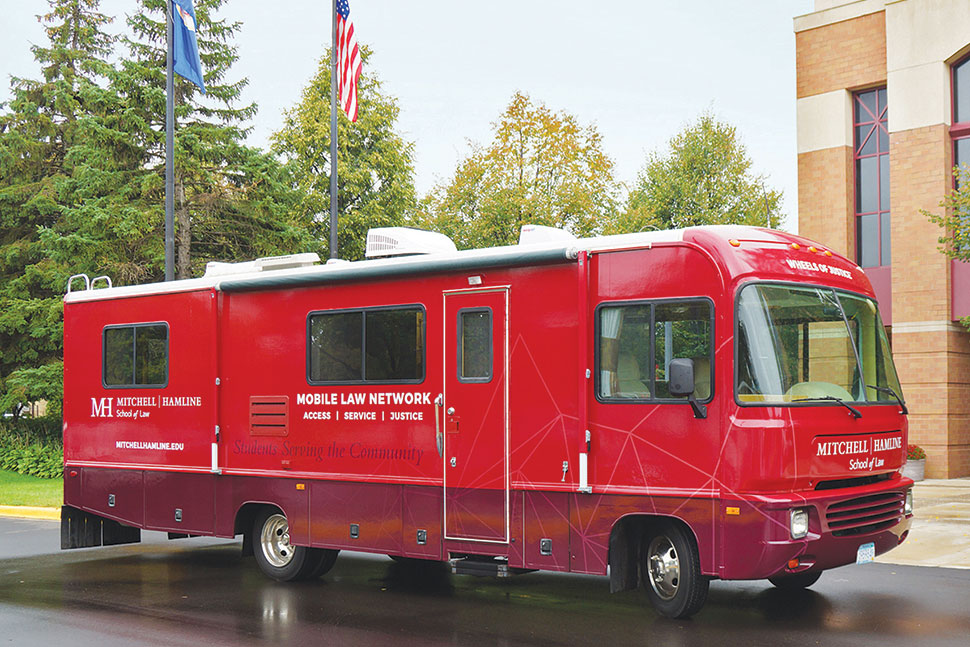Meeting Legal Needs

A mother of two told her partner she was taking the kids to the library—the only way her controlling partner would permit her to leave the house. While she was there, she met with an attorney who helped her escape the abusive relationship.
Aaron Mason, Cleveland Public Library’s (CPL) director of outreach and programming services, says that example from one of CPL’s monthly legal aid clinics shows how a number of libraries are filling a significant need in their communities by connecting patrons to civil legal aid.
Civil legal matters encompass noncriminal issues such as health care, housing, family, and employment law. While each of these can have a major impact on a person’s life, there’s no guarantee of legal representation as in criminal cases. Many people may not recognize that some of these problems have legal solutions, and many low-income individuals cannot afford legal representation, which has created what’s known as the justice gap.
According to the Legal Services Corporation’s (LSC) 2017 Justice Gap Report, 71% of low-income households experienced at least one civil legal problem in the previous year, but 86% of those problems did not receive adequate legal assistance.
“Libraries are in an almost ideal position to be a first encounter for people who have civil legal needs that aren’t being met,” says Betha Gutsche, WebJunction program manager for OCLC, which offers training through the Improving Access to Civil Legal Justice through Public Libraries training initiative with LSC and other partners. Clinics like those in Cleveland go a step beyond legal reference—they’re staffed by attorneys (or, in some cases, law students under attorney supervision) who can often answer questions and help file needed paperwork, even if they don’t provide full legal representation.
“Libraries are in an almost ideal position to be a first encounter for people who have civil legal needs that aren’t being met.” Betha Gutsche, WebJunction program manager for OCLC
One common need is criminal expungement. Arrest records often disqualify people from getting a job, but expungement can “seal” those events so they do not appear in background checks and do not need to be disclosed during the job application process. “Criminal expungement was the first legal programming we did,” says Rebecca Ryan, public services manager at St. Paul (Minn.) Public Library (SPPL). “We found ourselves with a high-priority service.”
SPPL now offers expungement workshops in conjunction with the Volunteer Lawyers Network twice a month and hosts two visits per month from the Mobile Law Network, a refurbished RV staffed by students from St. Paul’s Mitchell Hamline School of Law. “It’s great practice for students in responding to community questions [under attorney supervision], and great information for the community,” Ryan says. The library also presents 10 legal reference programs per month in partnership with Minnesota State Law Library.
The need is not only in cities. Wicomico Public Library (WPL) serves a rural area on the eastern shore of Maryland. It partners with the Maryland Volunteer Lawyers Service (MVLS), based two hours away in Baltimore, to provide clinics every other month. “Their director did some research and found that there were remote legal clinics in other places, so we figured it could work here,” says WPL Adult Services Manager Scott Mahler. While one local attorney provides in-person service at the library, most MVLS volunteers use Google Hangouts to consult remotely with patrons in the library’s computer lab.
Libraries interested in providing legal clinics may find eager partners in local legal aid organizations. “LSC has created a network of legal aid grantees that covers 100% of the country,” Gutsche says. Other libraries have partnered with local bar associations that encourage their members to provide pro bono service, or law schools that want to give students supervised real-world experience.
Strong impact, grateful patrons
Communication is an important factor in success, according to Caitlin Hoag, law librarian at Kalamazoo (Mich.) Public Library (KPL), which operates the Raymond W. Fox Law Library, provides legal reference, and hosts legal clinics. She says KPL’s “thorough intake process” includes a series of questions at sign-up (up to two weeks in advance) to make sure the patrons’ issues match the attorneys’ skills. “It lets [attorneys] prepare and helps them feel more comfortable.” That contact also gives librarians an outreach opportunity to remind the attorneys that they can access the law library’s books, online resources like Westlaw, and printouts.
Memphis Public Libraries (MPL), which has hosted monthly clinics provided by the Memphis Bar Association and Memphis Area Legal Services Inc. since April 2009, has seen the value of consistency. “Our clinics are always at the same place and always at the same time,” says Jessie Marshall, manager of MPL’s business and sciences department. Holding the legal clinic on the second Saturday of every month has “created a brand” patrons can identify, Marshall says.
The patrons who use the legal clinics don’t always report results back to the library, but consistent attendance suggests the necessity of the service. All of the libraries reported that their clinics typically attract at least 15–20 attendees; Marshall says MPL’s clinics usually serve 100 people per session.
The patrons who do follow up with the library often express immense gratitude. “We’ll get quotes on comment cards about how relieved patrons feel to have finally spoken to an attorney about a matter that may have been worrying them for a long time,” Marshall says. “They feel so unburdened by knowing what they need to do next.”
CPL’s Mason echoes those observations: “I can’t think of anything else we do that has such a significant impact on patrons’ lives.”
Source of Article